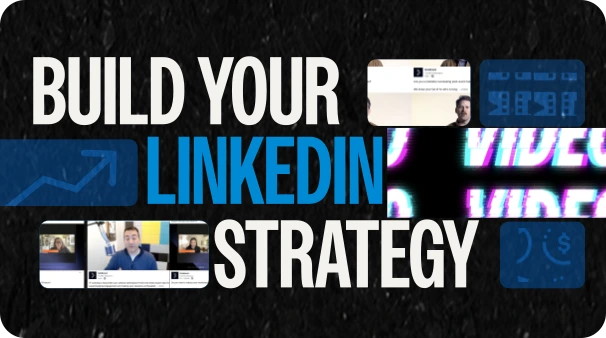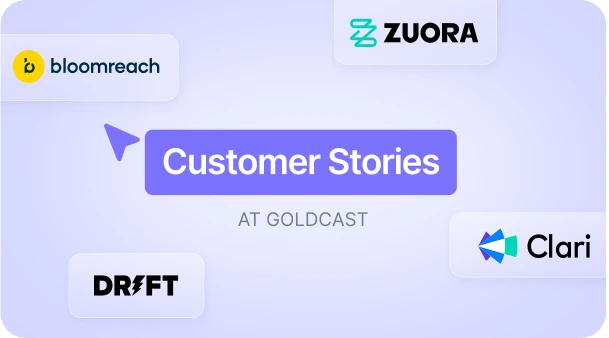Elevate Your Law Firm's Event Strategy: 6 Tips from Expert Legal Marketers

Maximize Your Marketing ROI
Join 10,000 other marketers already getting the best tips on running engaging events that boost pipeline and create raving fans.
As marketers, there are so many chances for us to niche and really go deep in one vertical or industry—and the legal field is a great example of that!
We recently hosted a panel of legal marketing experts to discuss the unique challenges and opportunities they face working with attorneys, promoting legal services, and staying on top of the latest relevant topics.
In this session, Goldcast's Co-Founder Kishore Kothandaraman spoke with Roy Sexton, Clark Hill's Director of Marketing; Jessica Grayson, Stroock's Managing Director; and Konstantin Shishkin, Chief Communications Officer at Goodwin.
You can catch up on the whole discussion below, or keep scrolling to discover our top takeaways from this amazing expert panel!
Here are the top six takeaways from our conversation ⤵
1. Embrace discomfort and model new behaviors
Attorneys are, by nature, risk-averse and marketers must be prepared to meet resistance. At times, you may feel more like a personal coach than a marketer—but the potential payoff is worth it! Getting a front row seat to that "lightbulb moment" when someone finally understands the power of good content is always a great place to be.
Let's talk about social media. If you're struggling to get people at your firm to share on their personal social media accounts, you aren't alone. Many attorneys fall into the trap of thinking, "Oh, I'm a criminal defense lawyer in Houston, Texas—and that's the only content my audience cares about."
Your response to this? Reiterate that they never know who might be interested in what they have to say. Each attorney's contact has many other contacts, and those people are all in their orbit, too.
Sharing different types of content (and we'll get into this more next) can show an audience that attorneys are multifaceted, robust people and help represent your firm in much the same way. It shows current and past clients that your law firm handles matters far beyond what one specific attorney does, making it less likely people will switch law firms when they have a new need.
If you're still having a hard time getting attorneys on board, you could lean on the spirit of competition. As risk shy as they may be, many lawyers can't help but join in when things get competitive! Celebrate the people who are using content in creative and advantageous ways and see who else comes along and wants to know how they can win, too.
Alternatively, you could lean toward collegiality instead of competition. If you frame sharing content as uplifting other colleagues, some of your more reserved people may be more likely to join in. Promoting other people doesn't feel nearly as awkward as promoting yourself, right? This can also highlight your collaborative company culture and show you're a great place to work, which is always a bonus!
Don't just push what you want, but understand the psychology of the resistance.” - Roy Sexton
Ultimately, you'll have to understand the reasons behind the resistance and model the behavior you want to see. Talk to people, and listen to their concerns. Be available to help attorneys set up their profiles and show them the basics of social media. Help them feel safe and reassure them that they aren't going to look foolish in front of their peers. That might be all it takes to get some initial buy-in!
2. Think beyond the legal field
So, how do you know what kind of content you should be creating or encouraging attorneys to share? Legal topics might seem like a no-brainer, but don't hesitate to dream much bigger than that.
While it is essential to understand the industry you're in (and the ethical ramifications in the legal world), so much of good marketing is industry-agnostic. If you only look at legal news, headlines, and copy, you may run the risk of recycling old practices instead of approaching things with fresh eyes.
So, when you're creating content, zoom out. Examine the big picture. Take an editorial approach in thinking about how to strategically approach your firm's various industry groups. Read the news headlines, look at marketing publications, and think about what people are discussing and how they're doing it.
Looking for recommendations of people or publications to follow? We've got you covered! Check out:
- Law.com
- The American Lawyer
- Law360
- Wall Street Journal
- Legal Marketing Association
- Thomson Reuters
- Financial Times
- Bloomberg
- Any location-specific publications that might apply
- LinkedIn experts in your field
3. Pay attention to what your audience wants
When it's time to start planning content and events, think about what people want to hear from you. There are obvious ways to get this information. You can survey people at the end of your event or conduct a poll to find out what folks want.
People are usually pretty open to letting you know what they want, so take advantage of that!
You can also pay attention to how people react to your content. There will be times you have to try something new and simply see how it goes—and that's okay! Use the data you gather from each event or content launch to inform and back up your future decisions.
For example, Roy found that the attorneys wanted to do a series of webinars and host four in a row. Yet, they found that enrollment for the series actually diminished over time, instead of building momentum the way they'd hoped.
Roy and his team realized: In today's workplace, no one wants to sign up for a four-week series. They want to sign up for one, and they might not even show up to that. Maybe people just want to watch an on-demand recording! Clark Hill used that information to move away from the webinar series and toward other events that met their audience's needs.
Similarly, we've found at Goldcast that our happy hours series didn't do well when they were strictly networking-oriented. We discovered that people really wanted some sort of education or learning piece tied to an event, so we paired our future happy hours with content and found that worked a lot better.
You should also pay attention to your metrics to find potential topic ideas. If people are clicking a lot on a certain attorney's videos, maybe they'd love an event featuring that speaker. If you're getting a lot of social media hits around a certain topic, perhaps you should host a webinar for people who want to learn more.
Finally, if something is trending in the news and your firm has an important POV to offer, leap on the chance. Konstantin was preparing a thought leadership series for financial services and technology clients when Silicon Valley Bank collapsed, and those topics became even more timely than expected—in fact, the webinar they held right after the crisis saw 3000 participants log on within the first two minutes!
4. Be encouraging of new ideas, but strategic with content launches
We've discussed that attorneys don't like a lot of uncertainty, which means that if they're coming to you with ideas or inspiration, you want to foster that spirit. At the same time, you want to manage expectations and make sure no one gets ahead of themselves.
That might mean having a list of go-to questions you ask when someone presents a new idea. Things like: What are we hoping to accomplish? What end result are we looking for? Who do we want to reach?
If they come to me and they've done the work, then I'm all in. You're invested, I'm invested—let's go, right?” - Jessica Grayson
Sifting through these answers can show you who's ready to take on the responsibility that comes with a new content launch. For example, many people get excited about doing podcasts—which is great, but it takes a lot of resources to launch one, from graphic design to tech setup to marketing efforts. So you want to be sure from the jump that you have enough support and content to not only kick it off, but keep it going.
5. Create connections at both ends of the event spectrum
There are many different types of events you can host. When it comes to creating deliberate networking opportunities in the legal field, our panel found that smaller, more targeted events and large events both worked well.
Interesting food for thought!
Jessica found that there's a lot of interest in the more exclusive, intimate events. Stroock's clients enjoy meeting other clients, mingling with the firm's staff, and having that intentional time to gather together and network.
Konstantin agreed, but he has also seen success with the other extreme: big marquee events put on by the firm. As an example, Goodwin hosts an annual conference called Real Estate Capital Markets Conference, in partnership with Columbia's Business School. People sign up in droves because they know they'll be able to network, learn from great speakers, and come together with their community.
Roy posited that perhaps the common thread between these events is that you lean into the needs of the people who are attending versus the needs of the people hosting. It's possible people are craving a social connection they can only find in smaller groups; hence, the success of those more targeted events. Meanwhile, the larger symposiums offer people a chance to not only commune, but to educate themselves and learn new things—so they'll sign up for those, too!
As with all content, it all comes down to being aware of who you want to attend and then asking yourself what that group wants. That will largely inform what type of event you choose to host.
6. Outline how you'll measure impact
Ask every marketer their least favorite part of the job, and many of them will say ROI.
This is understandable! Measuring the impact of your events can be challenging and downright nebulous. If you're doing thought leadership, for example, you won't be able to immediately show that it's helped you gain X amount of new clients. If you're a legal marketer producing a piece of content for an attorney, and then that gets picked up by a law journal, and then the attorney is invited to speak on a panel, and someone sees them there and ends up working with you—that's awesome, but pretty hard to actually track.
When it comes to tracking, remember that content doesn't exist in a vacuum. A centralized analytics structure can help you gain clarity and see how different channels are performing side by side. If you do a podcast or a webinar, you'll still want to know how that piece of content performed, but you also want to measure the performance of everything else you're doing to talk about that same topic.
Somebody once told me that one of the great ways to know how you're doing is to ask, and we actually do that.” - Konstantin Shishkin
You can also just ask clients what they think! It sounds simple, but talk to the lawyers and partners in your firm. Ask if they've heard anything—whether positive or negative—from clients. Do they have any thoughts about how content is performing? That feedback can be really helpful and provide unexpected insights.
Even if you're receiving mostly positive feedback, drill deeper. Try, "What could we improve?" or, "Is there anything that could have been better, in your opinion?" Asking these questions doesn't cost you anything extra or require you to hire anyone, but it could really help you evaluate your efforts in a way that your technical data can't.

Stay In Touch
Platform
Resources
Company
Community
© 2025 Copyright Goldcast, Inc. All rights reserved.



 Upcoming Events
Upcoming Events Event Series
Event Series On-Demand Events
On-Demand Events

